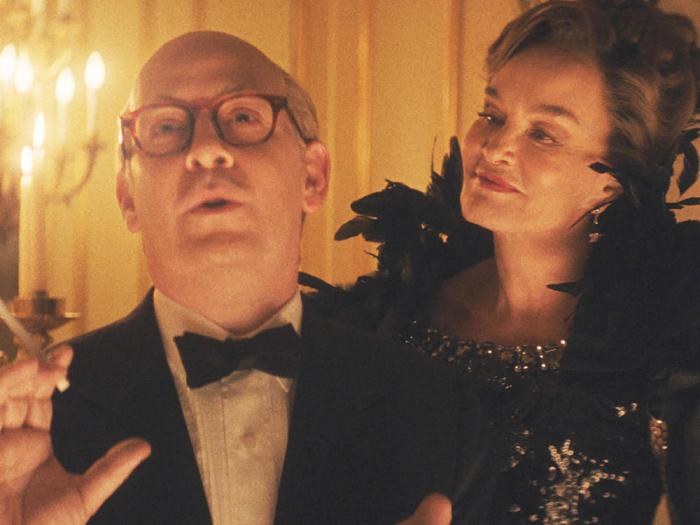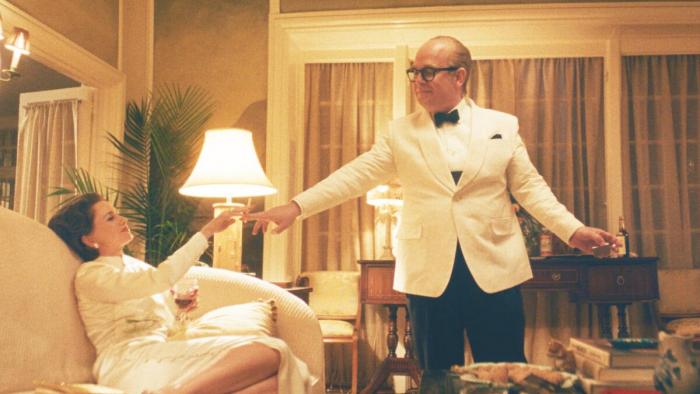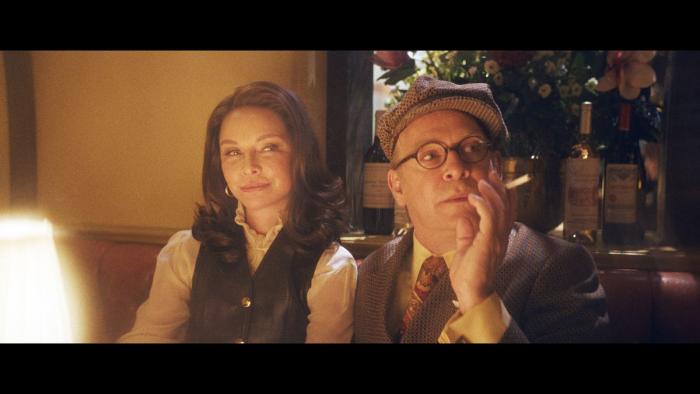

The 'Feud: Capote vs the Swans' Finale Is All Vibes, No Substance
By Chris Revelle | TV | March 14, 2024 |
By Chris Revelle | TV | March 14, 2024 |

Whether the resulting show is good, bad, or indifferent, you cannot deny that Ryan Murphy’s premises are awfully intriguing, like a series of excellent musings: What if we retold the story of Roanoke Colony through the lens of found footage and docu-horror? What if we did a comedic and satirical riff on femme-centric slashers? What if we did a surreal take on the real story of a family in their new home contending with a mysterious watcher? For Feud: Capote vs the Swans, the pitch seems to be “What if we retold the story of Truman Capote’s falling out with his circle of high-society women as a lavish period piece with the historical figures brought to life by an all-star cast?” It’s a tantalizing premise that’s bursting with storytelling opportunities, which is why it’s a shame that this season of Feud barely capitalized upon any of them.
Feud had its notable strengths. The presentation was consistently sublime with fabulous costumes, hair, and make-up sumptuously shot. The direction was similarly stellar, with most of the episodes helmed by the legendary Gus Van Sant. Jennifer Lynch’s eerie and dream-like penultimate episode was also a standout with its parade of deathbed dreams and psychopomps. The acting was always excellent, especially from Naomi Watts and Tom Hollander, and the cast can be thanked for finding what pathos and emotional connection viewers experienced in the show. Watts did her well-perfected combination of pain and beauty and Hollander nailed not only the Capote voice but his petulant childishness too. The good news is that despite the criticisms I’m about to deliver, Feud is a fun show. It’s well-made and entertaining.
It’s just that it’s a Ryan Murphy show and with that comes some drawbacks. The Murphyisms it avoids (a focus on moments over coherent plot, characterization that changes with the direction of the wind, the gender and sexual politics of 2005 frozen in amber, etc) are likely thanks to Murphy not writing or directing any episodes this season. However, his influence is still felt as a co-creator and executive producer, not to mention whatever expectations come with “a Ryan Murphy show.”

Unfortunately, even with all these elements going in its favor, Feud got terminally stuck in place and couldn’t move beyond the themes it began with nor deepen them satisfactorily. Perhaps the trouble started when we got to the central betrayal in the premiere episode and viewers were given precious seconds to observe and connect to Truman Capote’s friendships with seven different women before those relationships dramatically ended with the publishing of “La Cote Basque 1965.” Feud is very clear in its framing: this! Is! Huge! However, we’ve been given so little to connect to emotionally this soon in the series that it lacks the impact it wants to have. It’s difficult to feel the pain of these people at war with one another if we don’t see them during peacetime.
The show struggled mightily to move beyond this point, either into new themes or plot direction, and stagnated for its trouble. Beyond the big betrayal, Feud doesn’t have a ton to say, neither about the people involved nor the themes it merely grazes. Many of these themes are interesting, especially those about the complicated relationships between women and gay men in a heteronormative society. It’s just that nothing is dug into, nothing is unearthed. It comes down to being a well-crafted but emotionally inert reenactment, an unfortunate trend these days.
Writer Jon Robin Baitz adapted the show from Capote’s Women by Laurence Leamer and Feud is a good advertisement for the book; I want to read about this era, these people, their stories especially because the show doesn’t dig in. Feud couldn’t move beyond the surface and got stuck repeating itself for much of the season: Truman can’t stop drinking no matter how many famous people are trotted out to shake sense into him, Truman can’t finish his book, Babe Paley gets the same lunches with the same people to discuss the same regrets, Lee Radziwell and Slim Keith are mean and clever, Babe and her husband are unhappy, Truman is obsessed with Babe; none of these add upon each other and instead crowd the show as they multiply every episode, repeating the same emotional beats over and over and over.
It’s a strange feeling to have a show so knowledgeable about these people and this era but so incurious about them beyond their outward appearances. It makes what should feel poignant and ravishing somewhat distant and removed, like a historical account.

The finale tries to buck this trend and departs from the usual carousel of the same conversations by focusing on the shreds and bits of Answered Prayers Capote managed to write. We get a string of imagined vignettes in which Truman’s alter ego P.B. Jones spends time with each swan’s alter ego. A road trip, a cathartic smashing of china, conspiring to poison a philandering husband; the intent is elegiac, a look back at each of these friendships that sums them up, resolves them and sends them off. It’s easily one of the most creative episodes and a welcome change of pace.
In theory, this should have finally let us into whatever Truman had with each of these women, but it’s significantly mixed as executed. It’s great to see Truman and the story move toward resolution and to see these actors have different emotional beats to play, but Feud cannot resist rehashing. Even the attempts to explain deeper motivations, for Truman’s drinking, his writing, his relationships, are all merely tossed off and left unexamined. Even at its most reflective, Feud cannot bring itself to look deeper. Even the moments that attempt to broaden beyond Capote and the swans to more general eulogies for lost eras are superficial, merely repeating the sentiment instead of exploring it.
A brief scene sees four swans’ ghosts lamenting the “death of society,” and it’s a thrillingly creative moment, but we’re still back at the same well, we’re making the same character observations and re-stating the facts we know. This creative departure and the attempt to make some statement is welcome, but even when it’s setting out to tell us about these people, Feud can’t push past the surface. Feud: Capote vs the Swans had style, verve, and vibes in abundance; it would have been great if it brought that same elan to the substance it purports to show us.
← Weirdo Mia Wasikowska Is Back And Weirder Than Ever In The Wellness Satire 'Club Zero' | 'I Love You Forever' Preys Upon Your Worst Online Dating Fears →
More Like This
Charming Ramy Youssef Mines the Comedy of NPR's Tiny Desk Concerts as Host of 'SNL'
Spoilers: Netflix’s Korean Comedy 'Chicken Nugget' Is Getting Review-Bombed Over A Single Joke
How 'The Regime' and 'Palm Royale' Complicate Their Genres
Jenna Lyons Has Conditions For ‘Real Housewives’ Return
This Week On ‘Selling Sunset’: Irreconcilable Differences

Jenna Lyons Has Conditions For ‘Real Housewives’ Return
This Week On ‘Selling Sunset’: Irreconcilable Differences
Huey Lewis Was Inspired By 'Mamma Mia' For His Next 'Career Event'
Paramount+ Is Getting Cues From David Zaslav
Yorgos Lanthimos Reteams with Emma and Viggo Goes West In Three Trailers
Kristen Stewart Will Never Make an ‘Algorithmic’ Marvel Movie
More Like This
Charming Ramy Youssef Mines the Comedy of NPR's Tiny Desk Concerts as Host of 'SNL'
Spoilers: Netflix’s Korean Comedy 'Chicken Nugget' Is Getting Review-Bombed Over A Single Joke
How 'The Regime' and 'Palm Royale' Complicate Their Genres
Jenna Lyons Has Conditions For ‘Real Housewives’ Return
This Week On ‘Selling Sunset’: Irreconcilable Differences
Reviews